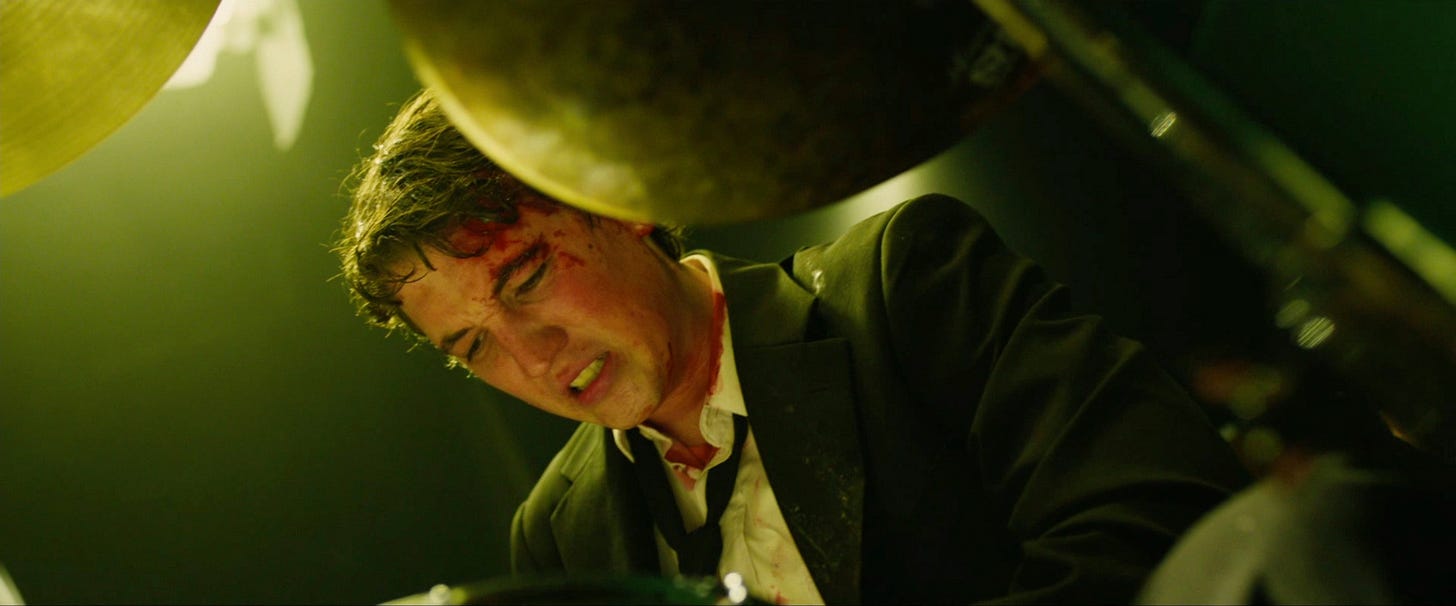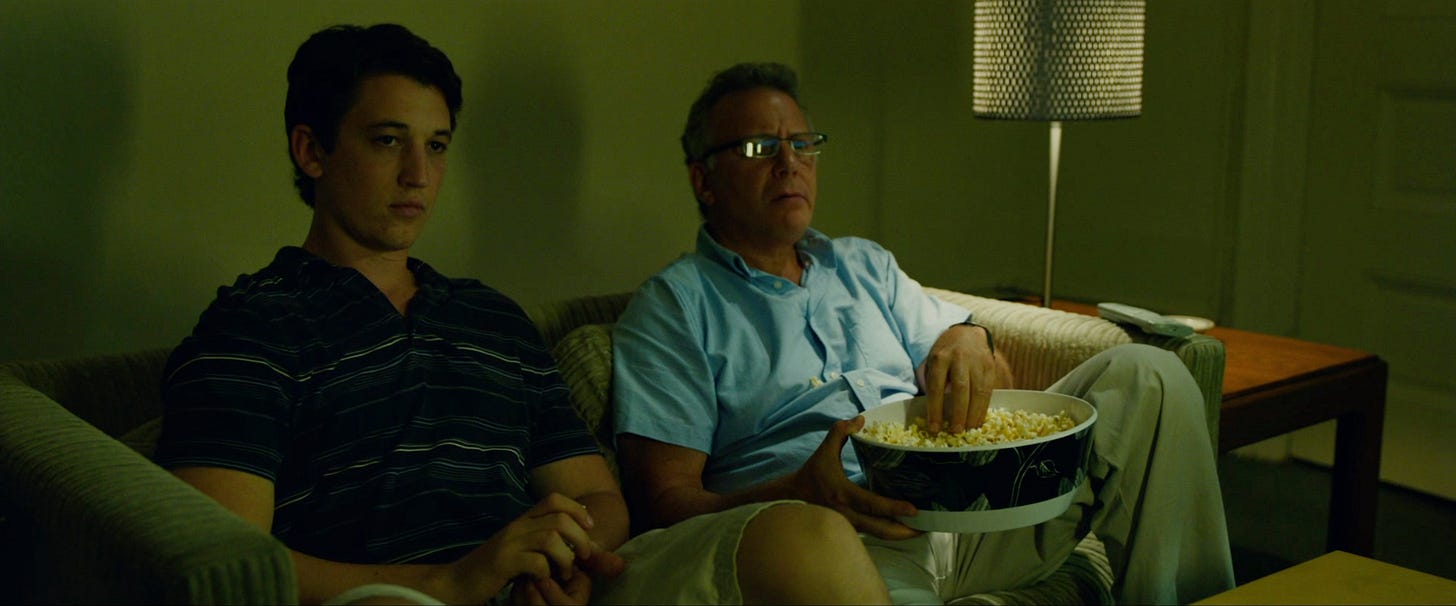Whiplash Structure Breakdown
Whiplash is a movie that I’ve taught for a number of years in my screenwriting class. While I primarily focus on how conflict plays out, it has some interesting structural elements in its narrative as well. Though it plays out in a typical three-act setup, the types of movie-level goals and the protagonist’s relationships to the other characters in the movie create some unique and exceptional aspects to the narrative. So please enjoy this look at Whiplash.
As always, these breakdowns contain SPOILERS, and are only recommended if you've already seen the movie. You can check my introduction to these breakdowns, to get an overview of my process and philosophy.
Feel free to let me know what you think in the comments below!
The Basics
Director: Damien Chazelle
Writers: Damien Chazelle
Release Date: 2014
Runtime: 107 Minutes
IMDB: https://www.imdb.com/title/tt2582802/
Movie Level Goals
Protagonist: Andrew Neiman
External: To impress Fletcher
SUCCESS | FAILURE | MIXED
Internal Goal: Find the drive to succeed
SUCCESS | FAILURE | MIXED
Goal Relationship: Internal Goal Leads to External Goal
Three Observations
Feel free to watch the video or read the transcript below it.
First Observation
The first thing we're going to talk about is the act-level goals of our protagonist, Andrew, and our antagonist, Fletcher. Normally, when we look at movie-level goals, we have three types:
1. **Opposed Goals**: This is where we have mutually exclusive goals. One character wants one thing, and the antagonist wants the other. Only one character can get what they want. For example, in Harry Potter, only Harry or Voldemort can win; they both can't get what they want.
2. **Different Goals**: Here, our characters want different things, and because they want different things, they may come into conflict. One may become antagonistic to the other because they want something different, but in the end, they can still potentially both get what they want. It doesn't mean they will, but they can.
3. **Complementary Goals**: In this case, the two characters want the same thing but may be in conflict over how to get it, where it will happen, or why it might happen. We often see complementary goals in romantic comedies where two people want to be together but can't quite figure out how to be together.
What's really interesting about Whiplash is that, on the surface, it feels like the goals are opposed. When you look at the character of Fletcher and the character of Andrew, they seem to be in total opposition. Their conflict is very high; they are constantly butting heads. Fletcher treats Andrew in terrible ways, so everything about that relationship feels like their goals are opposed. What's really interesting, though, is that they are not. They actually have complementary goals. It turns out they really want the same thing. Andrew wants to be the best drummer he can be; he wants to impress Fletcher and potentially be one of the great drummers. Fletcher wants Andrew to be a great drummer, potentially one of the greatest drummers of all time. They both want the same thing. Where they come into conflict is in how to make that happen, specifically in the ways Fletcher pushes Andrew and the methods he uses. At the end of the movie, Andrew seems receptive to those things, rises to the occasion, and it seems like they will both accomplish their complementary goals as Andrew rises to the trap that Fletcher has set for him at the JVC concert.
Second Observation
Our second observation is about relationship goals. Generally, we have an external goal and an internal goal in movies. Oftentimes, if we have a relationship goal, it is an internal movie-level goal. For example, we might have a protagonist trying to defeat an antagonist and also have an internal goal to satisfy or be in a romantic partnership or relationship, trying to get that to work. Its success or failure is often dependent on whether they will succeed or fail at this broader external goal they are trying to achieve.
What's interesting about Whiplash is that it does have some relationship goals, but they never rise to the level of movie-level goals and really don't become internal goals for our main character, Andrew. Specifically, Andrew starts a relationship with the character of Nicole. He meets her at the movie theater, asks her out, and they go on a couple of dates. It really feels like it's setting up that a relationship with Nicole is going to be the internal relationship that drives the internal goal that Andrew is interested in. But Andrew ends up breaking up with Nicole because, in his view, Nicole is getting in the way of his pursuit of his external goal of becoming a great drummer. So, even though we have what's set up as what seems like a typical relationship internal goal, that goal kind of falls by the wayside, and eventually, Andrew is the one who rejects it.
We can say the same thing about Andrew's relationship with his father, Jim. Jim plays a part in a couple of scenes, and we might posit an internal relationship where Andrew has to come to peace with his relationship with his father. That is kind of there; it's a bit of an internal goal for Andrew, but like the relationship with Nicole, it really gets pushed down and only plays out in three or four scenes across the whole movie. Although it does play a part at the end because Jim is at the JVC concert, he sees how Fletcher baits and traps Andrew and expects Andrew to walk away, but Andrew doesn't. In the end, Andrew sort of chooses Fletcher over his own dad. But again, that relationship goal doesn't play out in the typical internal kind of setup that we're used to seeing in Hollywood movies. So, it's a really fascinating way that both the relationship goals with Nicole and Jim don't quite rise to the level of movie-level goals but are still there and still provide subplots for the movie.
Third Observation
The third observation is about our typical second act low point. Whiplash is a typical three-act movie. Sometimes movies have four acts; sometimes they have five acts. This one is a typical three-act movie. One of the things we often see at the end of the second act is that our protagonist is at their very lowest. They have been defeated, and it seems like there's no way for them to win. Unlike our first two observations, which saw Whiplash kind of do things differently, this one is pretty similar to what we see in other movies in that Andrew is basically defeated at the end of the second act. He has gotten Fletcher fired from his job, and he's at a low point. What's kind of interesting and fascinating is that he gives up on his external goal altogether. He quits drumming; he decides he's not going to drum at all, and it seems like that's the end of the road. It almost feels like it's going to be the end of the movie. But, of course, as we move into the final act, the third act, Andrew runs into Fletcher at a bar. Fletcher invites Andrew to play at the JVC concert, really to get back at him, but also perhaps to test him. So, Andrew returns to his external goal, and we've got this great climax where Andrew plays at the JVC concert. They end up playing music he's not familiar with, and he is able to come through, rise to the challenge, and prove to Fletcher that he can be one of the great drummers.










This was exactly what I was looking for. Straight to the point and explained perfectly. As a total novice of a film student, I sincerely thank you.